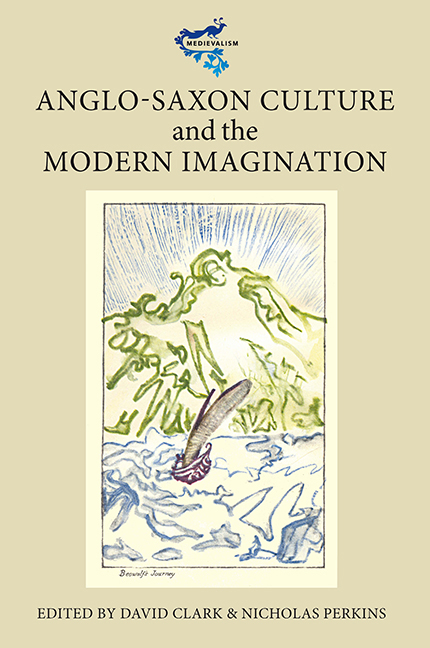Book contents
- Frontmatter
- Contents
- List of Illustrations
- Contributors
- Foreword
- Acknowledgements
- Abbreviations
- Introduction
- 1 From Heorot to Hollywood: Beowulf in its Third Millennium
- 2 Priming the Poets: The Making of Henry Sweet's Anglo-Saxon Reader
- 3 Owed to Both Sides: W.H. Auden's double debt to the literature of the North
- 4 Writing for an Anglo-Saxon Audience in the Twentieth Century: J.R.R. Tolkien's Old English Chronicles
- 5 ‘Wounded men and wounded trees’: David Jones and the Anglo-Saxon Culture Tangle
- 6 Basil Bunting, Briggflatts, Lindisfarne, and Anglo-Saxon Interlace
- 7 BOOO Seeing Beowulf in Pictures and Print
- 8 Window in the Wall: Looking for Grand Opera in John Gardner's Grendel
- 9 Re-placing Masculinity: The DC Comics Beowulf Series and its Context, 1975–6
- 10 P.D. James Reads Beowulf
- 11 Ban Welondes: Wayland Smith in Popular Culture
- 12 ‘Overlord of the M5’: The Superlative Structure of Sovereignty in Geoffrey Hill's Mercian Hymns
- 13 The Absent Anglo-Saxon Past in Ted Hughes's Elmet
- 14 Resurrecting Saxon Things: Peter Reading, ‘species decline’, and Old English Poetry
- Index
Foreword
Published online by Cambridge University Press: 20 April 2017
- Frontmatter
- Contents
- List of Illustrations
- Contributors
- Foreword
- Acknowledgements
- Abbreviations
- Introduction
- 1 From Heorot to Hollywood: Beowulf in its Third Millennium
- 2 Priming the Poets: The Making of Henry Sweet's Anglo-Saxon Reader
- 3 Owed to Both Sides: W.H. Auden's double debt to the literature of the North
- 4 Writing for an Anglo-Saxon Audience in the Twentieth Century: J.R.R. Tolkien's Old English Chronicles
- 5 ‘Wounded men and wounded trees’: David Jones and the Anglo-Saxon Culture Tangle
- 6 Basil Bunting, Briggflatts, Lindisfarne, and Anglo-Saxon Interlace
- 7 BOOO Seeing Beowulf in Pictures and Print
- 8 Window in the Wall: Looking for Grand Opera in John Gardner's Grendel
- 9 Re-placing Masculinity: The DC Comics Beowulf Series and its Context, 1975–6
- 10 P.D. James Reads Beowulf
- 11 Ban Welondes: Wayland Smith in Popular Culture
- 12 ‘Overlord of the M5’: The Superlative Structure of Sovereignty in Geoffrey Hill's Mercian Hymns
- 13 The Absent Anglo-Saxon Past in Ted Hughes's Elmet
- 14 Resurrecting Saxon Things: Peter Reading, ‘species decline’, and Old English Poetry
- Index
Summary
Since the late eighteenth century and the onset of Romanticism in England, interest in Anglo-Saxon culture has grown steadily, through academic investigation, myth-making, translation, and popular culture, up to the extraordinary success of Seamus Heaney's translation of Beowulf in 1999, and beyond into the twenty-first century. There has, too, been a developing scholarly interest in the theory of ‘Medievalism’, in studies by Michael Alexander and others. Heaney's translation echoed that, but was also the culmination of an insistent Old English presence in his poetry ever since North in 1975; the whole myth of the ‘Bog People’ that was the vivifying strand in his North and Wintering Out is founded in the northern past. Amongst modern poets, even before North, Geoffrey Hill in 1971 had taken the title of a ground-breaking book from a time-honoured item in Sweet's Reader, ‘Mercian Hymns’. Earlier again, Anglo-Saxon poetry was firmly installed in the modern pantheon by Pound and Auden, whose versions of ‘The Seafarer’ and ‘The Wanderer’ respectively never lost their grip on the poetic imagination in English.
Anglo-Saxon Culture and the Modern Imagination, then, is responding crucially to the spirit of its moment, and of other moments of intersection between past and present. The book is in part the product of a very successful and crowded conference under the title Bone Dreams (derived from Heaney's poem of that title in North), held at the Faculty of English in Oxford University on Saturday 26 April 2008. The conference was organized by the present editors, and it brought together an enthusiastic gathering of students, writers and academics in lively debate. A glance at the contents of the book makes it clear how wide-ranging the recent influence of Old English has been: on the poetry of Heaney, Hill, Basil Bunting, Ted Hughes, and Peter Reading, but also extending to P.D. James's crime fiction as well as to children's literature, comics, opera, and the cinema. The line back to the Modernists is traced here too, in chapters on David Jones and W.H. Auden. Beowulf bulks large in all of this but it is not on its own.
In pondering the relative familiarity of the classical heritage and the Anglo-Saxon past, Heaney said memorably in the introduction to his Beowulf translation that ‘Achilles rings a bell, but not Scyld Scēfing.’ The evidence of this book is that this is becoming less true.
- Type
- Chapter
- Information
- Anglo-Saxon Culture and the Modern Imagination , pp. xi - xiiPublisher: Boydell & BrewerPrint publication year: 2010



